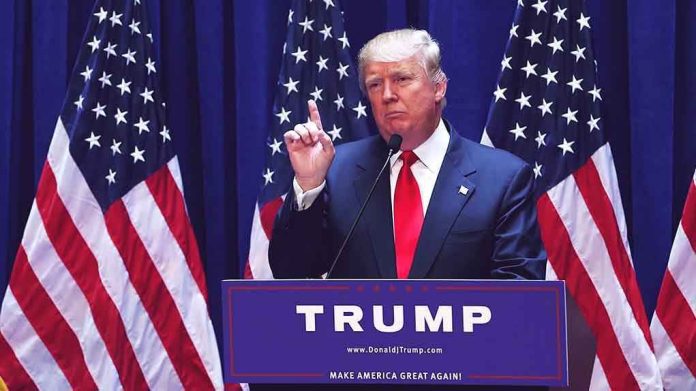
Technical failures at the United Nations spark controversy and highlight the ongoing tensions between Trump’s administration and international institutions.
Story Highlights
- Trump forced to ad lib speech at the UN due to teleprompter failure.
- Escalator malfunction at UN headquarters attributed to Trump’s team.
- Initial sabotage claims debunked by UN investigation.
- Incident fuels ongoing distrust between Trump supporters and global institutions.
Trump’s Unexpected Speech Challenge
During the 80th United Nations General Assembly in September 2025, President Donald Trump faced unexpected challenges when an escalator malfunction forced him to walk and a subsequent teleprompter failure compelled him to ad lib his speech. This series of technical issues occurred at a high-profile event, drawing immediate criticism from Trump, who publicly accused the UN of orchestrating the mishaps. However, later investigations revealed that these failures were due to actions by members of Trump’s own delegation.
Trump’s aides and supporters were quick to allege sabotage, framing the incidents as deliberate attempts to embarrass the former president on an international stage. The White House Press Secretary, Karoline Leavitt, initially demanded accountability, further escalating the situation. However, UN officials promptly investigated the incidents and clarified that the escalator stop was triggered by a US delegation videographer, and the teleprompter was under the control of the White House, not the UN staff.
Clarification and Reaction
The UN’s findings were a significant blow to the sabotage narrative initially pushed by Trump’s team. Despite the clarification, the incidents underscored the ongoing tensions between Trump’s political base and international institutions like the UN. This episode not only highlighted the logistical complexities of hosting such a high-profile event but also demonstrated how quickly technical issues can become politicized. Trump’s criticism of the UN, a recurring theme in his political rhetoric, was amplified by media allies, further fueling distrust among his supporters.
Political analysts noted the incident as an example of how technical issues can be weaponized for political messaging. The rapid spread of misinformation and the role of partisan media in shaping narratives were evident in the immediate aftermath. While the UN successfully clarified the facts, Trump’s initial response and the media coverage left a lasting impact on perceptions among his base.
Repercussions and Future Implications
The short-term impact of these incidents was an intense media focus on Trump’s reaction and the subsequent blame game, causing a brief strain in diplomatic relations between the US delegation and UN staff. In the long term, this episode reinforced narratives of distrust between Trump’s supporters and global institutions, potentially setting the stage for similar incidents to be politicized in the future. It also highlighted the need for robust crisis communication strategies and technical reliability at major international events.
Despite the resolution, the incident serves as a reminder of the polarized environment in which international diplomacy now operates. As Trump continues to navigate his presidency, the interplay between technical mishaps and political narratives will likely remain a significant aspect of his engagement with global institutions.


